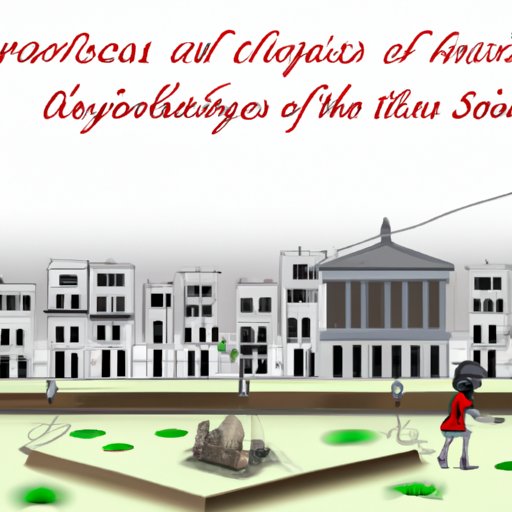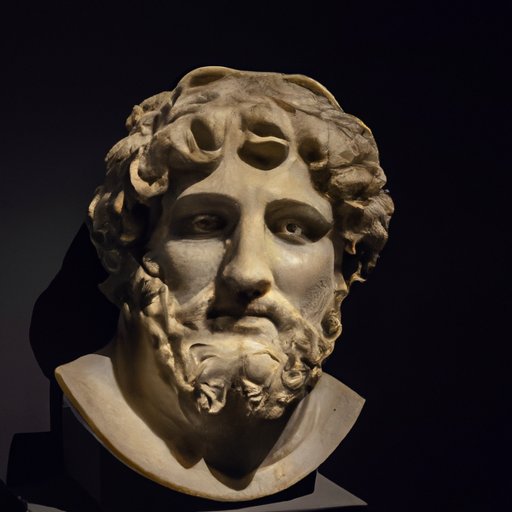Introduction
Hellenistic culture refers to the culture that developed in Greece and other regions of the Mediterranean during the period from 323 BC to 31 BC. This era was marked by the rise and fall of powerful empires such as the Ptolemaic dynasty in Egypt and the Seleucid Empire in Persia. During this period, there were major political, social, and cultural changes which had a lasting impact on the ancient world.
A Historical Overview of Hellenistic Culture
The origins of Hellenistic culture can be traced back to the death of Alexander the Great in 323 BC. His death marked the end of the classical period in Greece and the beginning of a new era of Hellenistic culture. After Alexander’s death, his vast empire was divided among his successors, who established their own kingdoms in various parts of the Mediterranean. These new kingdoms brought with them a mixture of Greek, Persian, and Egyptian cultures, which began to merge into a single Hellenistic culture.
During this period, there were major political, social, and cultural changes. The most significant of these was the emergence of the great Hellenistic cities such as Alexandria in Egypt, Antioch in Syria, and Pergamon in Turkey. These cities became important centers of learning and culture, where scholars and artists gathered to share their knowledge and ideas. They also served as hubs for the exchange of goods and ideas between the different regions of the Mediterranean.
Exploring the Art, Architecture and Philosophy of Hellenistic Culture
Hellenistic culture is known for its unique blend of art, architecture, and philosophy. Hellenistic art was characterized by a realistic approach to depicting the human body and nature. Artists of this period focused on conveying emotion and movement in their works, often using vivid colors and bold compositions. Examples of Hellenistic art can still be seen today in many museums around the world.
The architecture of Hellenistic culture was equally impressive. This period saw the construction of grand public buildings such as libraries, theaters, and stadiums, often adorned with sculptures and ornate columns. The most famous example of Hellenistic architecture is the Mausoleum of Halicarnassus, one of the Seven Wonders of the Ancient World.
Finally, Hellenistic culture is also known for its philosophy. This period saw the rise of influential thinkers such as Epicurus, Zeno, and Aristotle, who developed new theories about the nature of reality and the structure of the universe. Their work had a profound influence on later generations of philosophers and scientists.

The Impact of Hellenistic Culture on the Ancient World
The spread of Hellenistic culture had a profound effect on the ancient world. As the borders of the Hellenistic empires expanded, so did the opportunities for trade and commerce. This allowed merchants to travel further afield and introduced new goods and technologies to distant lands. The result was an increase in economic prosperity and cultural exchange between the different regions of the Mediterranean.
In addition, Hellenistic culture also spread the Greek language, religion, and culture throughout the region. This had a lasting impact on the societies of the ancient world, shaping their laws, customs, and beliefs.

The Influence of Hellenistic Culture on Modern Society
Today, the legacy of Hellenistic culture can still be seen in many aspects of modern life. The art, architecture, and philosophy of this period have had a lasting influence on Western culture. The sculptures, buildings, and theories developed during this time are still studied and admired today.
In addition, Hellenistic culture has also had a profound influence on modern science, mathematics, and medicine. Many of the scientific theories and mathematical concepts developed during this period are still in use today. For example, Euclidean geometry, which was developed by the Greek mathematician Euclid, is still used in many fields of mathematics.
How Hellenistic Culture Changed the Course of History
By expanding their empires and introducing new technologies, the Hellenistic rulers had a profound effect on the course of history. The increased trade and commerce created by their rule led to the growth of cities and the emergence of new markets. This in turn led to the development of new military tactics, such as siege warfare and naval battles, which changed the way wars were fought.
The expansion of the Hellenistic empires also allowed for the spread of Greek culture throughout the Mediterranean. This had a lasting impact on the societies of the region, as many adopted the language, religion, and customs of their Greek conquerors.

An Analysis of the Legacy of Hellenistic Culture
The legacy of Hellenistic culture can still be felt in many aspects of modern life. Its art, architecture, and philosophy have had a lasting influence on Western culture, while its scientific and mathematical discoveries continue to shape our understanding of the world. In addition, the expansion of the Hellenistic empires allowed for the spread of Greek culture throughout the Mediterranean, which had a lasting impact on the societies of the region.
Finally, it is also worth noting the impact that Hellenistic culture had on later civilizations. Its influence can be seen in the Roman Empire, which adopted many of the political, social, and cultural ideals of the Greeks. The legacy of Hellenistic culture can also be seen in the Renaissance, which drew heavily on the achievements of this period.
Conclusion
Hellenistic culture was a period of great political, social, and cultural change which had a lasting impact on the ancient world. Its art, architecture, and philosophy have had a major influence on modern society, while its scientific and mathematical discoveries continue to shape our understanding of the world. The legacy of Hellenistic culture can still be seen in many aspects of modern life, and its influence on later civilizations cannot be overstated.
(Note: Is this article not meeting your expectations? Do you have knowledge or insights to share? Unlock new opportunities and expand your reach by joining our authors team. Click Registration to join us and share your expertise with our readers.)
